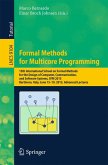We have all experienced delays and frustrations as a result of the notorious 'computer glitch.' However, the more dependent we become on computational systems in our daily lives, the more we must ensure that they are safe, reliable and user-friendly.
This engaging textbook presents the fundamental mathematics and modelling techniques for computing systems in a novel and light-hearted way, which can be easily followed by students at the very beginning of their university education. Key concepts are taught through a large collection of challenging yet fun mathematical games and logical puzzles that require no prior knowledge about computers. The text begins with intuition and examples as a basis from which precise concepts are then developed; demonstrating how, by working within the confines of a precise structured method, the occurrence of errors in the system can be drastically reduced.
Topics and features:
This clearly written and classroom-tested textbook/reference is essential reading for first-year undergraduate modules on discrete mathematics and systems modelling.
This engaging textbook presents the fundamental mathematics and modelling techniques for computing systems in a novel and light-hearted way, which can be easily followed by students at the very beginning of their university education. Key concepts are taught through a large collection of challenging yet fun mathematical games and logical puzzles that require no prior knowledge about computers. The text begins with intuition and examples as a basis from which precise concepts are then developed; demonstrating how, by working within the confines of a precise structured method, the occurrence of errors in the system can be drastically reduced.
Topics and features:
- Introduces important concepts from discrete mathematics as the basis of computational thinking, presented in a stimulating and motivating style
- Demonstrates how game theory provides a paradigm for an intuitive understanding of the nature of computation
- Contains more than 400 exercises throughout the text, with detailed solutions to half of these presented at the end of the book, together with numerous theorems, definitions and examples
- Describes an approach to the modelling of computing systems based on state transition systems, exploring the languages and techniques for expressing and reasoning about systems specifications and concurrent implementations
This clearly written and classroom-tested textbook/reference is essential reading for first-year undergraduate modules on discrete mathematics and systems modelling.
Dieser Download kann aus rechtlichen Gründen nur mit Rechnungsadresse in A, B, BG, CY, CZ, D, DK, EW, E, FIN, F, GR, HR, H, IRL, I, LT, L, LR, M, NL, PL, P, R, S, SLO, SK ausgeliefert werden.
"This book by UK academics Moller (Swansea Univ.) and Struth (Univ. of Sheffield) is designed to serve as a textbook for first-year university students in computer science. The volume contains 15 chapters, divided in two parts. ... libraries may wish to acquire it for the benefit of advanced undergraduates. Summing Up: Recommended. Only comprehensive academic mathematics and computer science collections." (B. Borchers, Choice, Vol. 51 (7), March, 2014)
"This book contains essential mathematics and modelling techniques for computing systems for which a presentation style suitable for first year undergraduate students has been chosen. ... The book contains more than 200 exercises throughout the text and provides complete solutions at the back of the book on more than 80 pages." (Gudula Rünger, zbMATH, Vol. 1278, 2014)
"This book contains essential mathematics and modelling techniques for computing systems for which a presentation style suitable for first year undergraduate students has been chosen. ... The book contains more than 200 exercises throughout the text and provides complete solutions at the back of the book on more than 80 pages." (Gudula Rünger, zbMATH, Vol. 1278, 2014)









